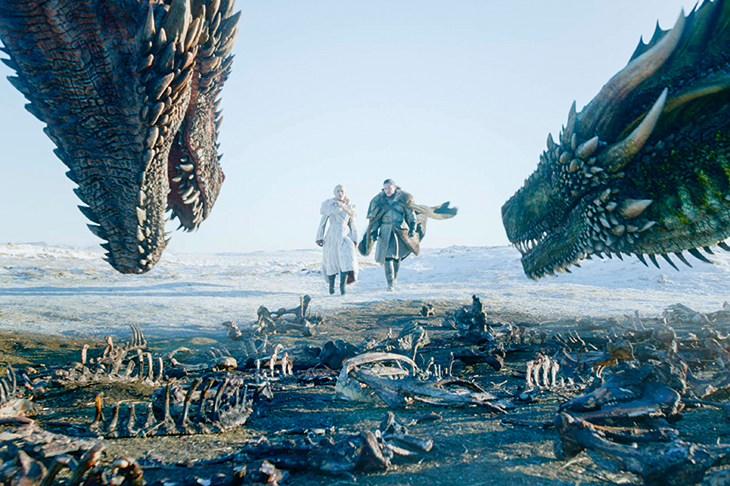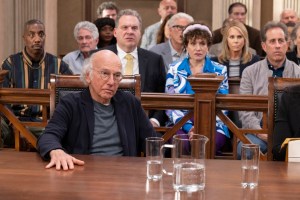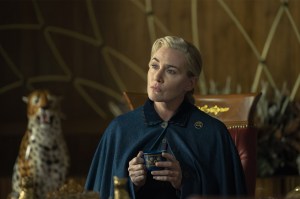If you’ve ever faced the social embarrassment of having to admit that you’ve never seen Game of Thrones (HBO, Sunday), then imagine what it’s like when you’re a TV reviewer. The customary excuse of ‘There really isn’t time to keep up with everything on telly’ might work for most series. But now that GoT is officially a show that everybody watches (apart from all the people who don’t), it’s beginning to feel a bit feeble for this one. So it was that, after reading up as best I could on the scores of backstories over the weekend, I decided to give the final series a go.
I was, of course, expecting the show to have an epic feel. Nonetheless, it was something of a surprise to discover just how thoroughly GoT embraces the traditional trappings of the genre: not merely the castles lit by flaming torches, the randomly medieval names, the frank fetishization of swords and so on, but also the distinct air of self-importance and the often comically po-faced dialogue.
Sunday’s episode duly began with a huge CGI army on the march, as Jon Snow and Daenerys Targaryen headed for Winterfell, the northern part of the Seven Kingdoms, to help defend the local forces against the evil White Walkers, who are no less threatening for all being dead. (That pre-show reading up did rather pay off.) Once they arrived, a handy summary of the situation was provided by young Bran — who I do also know is really a three-eyed raven, even if he looks weirdly like a human boy. ‘The Night King has your dragon,’ he told Daenerys, ‘the wall has fallen, the dead march south.’
Still, it could have been worse. Thanks to Jon Snow, the still-alive people have assembled ‘the greatest army the world has ever seen’, complete with two dragons of their own. What they might not have, mind you, is the required unity. Many of the northerners want Jon Snow (it seems obligatory always to use his full name) to remain their king. Unfortunately, as about the only character not obsessed with personal power, he’s ‘bent the knee’ to Daenerys, making her Winterfell’s Queen — although his motives may extend beyond a selfless desire for military alliance. In one particularly touching scene, the couple mounted a CGI dragon each and flew to an isolated CGI waterfall for a spot of quality time together. ‘We could stay here a thousand years. No one would find us,’ mused Daenerys. ‘We’d be pretty old,’ Jon Snow unarguably replied.
In fact, Jon Snow is such a decent cove that he even appears to trust Cersei Lannister, who sits on the Iron Throne as the Queen of all Seven Kingdoms. Sadly, rather than wanting to help the anti-dead alliance, Cersei seems to have some treacherous plans to undermine it. Before that, though, she had to decide whether to allow the villainous Euron to carry out his declared plan to ‘fuck the Queen’. At first, she demurred with uncharacteristic coyness: ‘If you want a whore, buy one. If you want a queen, earn her.’ But not for long. Meanwhile, a bloke who’d opted to buy no fewer than three whores — thereby supplying one of those scenes of gratuitous GoT nudity I’ve read so much about — was interrupted in mid-foursome by one of her courtiers and asked to go and kill her brothers in Winterfell. (If all this sounds complicated, I promise I’m simplifying it to the point of grossness.)
Then came the big moment that GoT fans have apparently been waiting for — together with another striking example of that tendency to tin-eared dialogue. As viewers have known for a while, Jon Snow is not the illegitimate son of Ned Stark after all; he’s actually the rightful king of the Seven Kingdoms. Or, as his friend Sam put it when the time for revelation finally came, ‘You’ve never been a bastard. You’re Aegon Targaryen, the heir to the Iron Throne!’ — before adding bathetically, ‘I’m sorry, I know it’s a lot to take in.’
It’s impossible not to admire the sheer scale and ambition of GoT’s storytelling: its unrelenting twistiness, its endless piling up of moral dilemmas, its almost Brexit-like ability to keep us entirely in the dark as to how it will all end (although I’m guessing the makers won’t be asking for an extension). I can even buy the idea that it’s a powerful portrait of the effects of power — and it certainly passed the key test of any drama series, by making me want to watch the remaining episodes.
And yet, I still can’t help wondering if, in their quiet moments, even the most die-hard of GoT fans have to suppress a little inner voice asking whether the whole thing is well… just a little bit corny.
This article was originally published in The Spectator magazine.


















